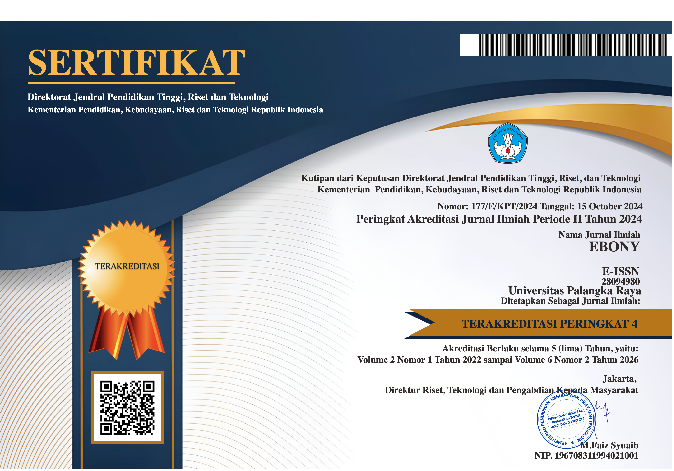Continuing Professional Development and English Language Teachers’ ICT Uptake
DOI:
https://doi.org/10.37304/ebony.v4i2.14191Keywords:
CPD, English language teaching, ICT uptake, TPACKAbstract
This paper presents the discussion on the impact of Continuing Professional Development (CPD) to English language teachers’ decision and performance in the use of Information and Communication Technology (ICT) in teaching. This study carried out a multiple study on two different teachers from different institutional and academic status background in Indonesia. Interviews were carried out to the participant to obtain deeper information concerning their experience in different types of CPD, and how it could influence the way they perceive ICT usefulness and enhance their teaching performance. The result of this study is expected to provide practical contributions particularly to the policy makers to improve teachers’ competences by designing appropriate curriculum and CPD in accordance with the teachers’ need in the digital era. The result of study indicated that both teachers tended to develop their TPACK (Technological, Pedagogical and Content Knowledge) competences from informal CPD they had from informal co-learning with colleagues and informal network learning from online resources. They also pointed out that governments provided teachers with online-based training that they could access to governments’ official websites.
Downloads
References
Alivi, J. S. (2022). Explaining why teachers use ICT for teaching and learning: A case study of English as a foreign language teachers in a university in Indonesia. Doctoral Thesis, University of Warwick, Coventry.
Ertmer, P. A. (2005). Teacher pedagogical beliefs: The final frontier in our quest for technology integration? Educational technology research and development, 53(4), 25-39.
Gamlo, N. H. (2014). EFL teachers use / non-use of ICT at a university in Saudi Arabia. Doctoral Thesis. University of Warwick, Coventry.
Ghamdi, K. (2015). Can an ICT CPD programme have an impact on EFL teachers in Saudi Arabia: A case study. Doctoral Thesis. Univeristy of Warwick, Coventry.
Guo, R. X., Dobson, T., & Petrina, S. (2008). Digital natives, digital immigrants: An analysis of age and ICT competency in teacher education. Journal of Educational Computing Research, 38(3), 235-254.
Guskey, T. R. (2000). Evaluating Professional Development. California: Corwin press.
Jayanti, F.G. & Norahmi, M. (2014). EFL: Revisiting ELT practices in Indonesia. Journal on English as a Foreign Language, 4(1), 5-13. DOI : https://doi.org/10.23971/jefl.v4i1.70
Kessler, G., & Hubbard, P. (2018). Language teacher education and technology. In C. A. Chapelle & S. Sauro (Eds), Handbook of technology and second language teaching and learning (pp. 278–292). John Wiley & Sons, Inc.
Kumar, S., & Daniel, B. K. (2016). Integration of learning technologies into teaching within Fijian Polytechnic Institutions. International Journal of Educational Technology in Higher Education, 13(1).
Lawless, K. A., & Pellegrino, J. W. (2007). Professional development in integrating technology into teaching and learning: Knowns, unknowns, and ways to pursue better questions and answers. Review of Educational Research, 77(4), 575-614.
Lieberman, A. (1995). Practices that support teacher development: Transforming conceptions of professional learning. Innovating and Evaluating Science Education: NSF Evaluation Forums 95(64), 67-78.
Marsh, H. W. (2007). Do university teachers become more effective with experience? A multilevel growth model of students' evaluations of teaching over 13 years. Journal of educational psychology, 99(4), 775.
Mishra, P., & Koehler, M. J. (2006). Technological Pedagogical Content Knowledge: A framework for teacher knowledge. Teachers College Record, 108(6), 1017-1054.
Norahmi, M. (2017). 21st-Century teachers: the students’ perspectives. Journal on English as a Foreign Language, 7(1), 77-96. DOI: https://doi.org/10.23971/jefl.v7i1.538
Oakley, G., & Pegrum, M. (2015). Engaging in networked learning: Innovating at the intersection of technology and pedagogy. Education Research and Perspectives, 42, 397-428.
Ravandpour, A. (2019). The relationship between EFL teachers’ continuing professional development and their self-efficacy: A structural equation modeling approach. Cogent Psychology, 6 (1), 1-13.
Richards, J. C., & Farrell, T. S. C. (2005). Professional development for language teachers: Strategies for teacher learning. Cambridge, UK: Cambridge University Press.
Rienties, B., Brouwer, N., & Lygo-Baker, S. (2013). The effects of online professional development on higher education teachers' beliefs and intentions towards learning facilitation and technology. Teaching and teacher education, 29, 122-131.
Robinson, C., & Sebba, J. (2004). A review of research and evaluation to inform the development of the new postgraduate professional development programme. TTA: University of Sussex.
Simons, H. (2009). Case study research in practice. London: SAGE.
Wang, X., Jacbo, J.W., Blakesley, C.C., Xiang, W., Ye, H., Xu, S., & Lu. F. (2020). Optimal professional development ICT training indicatives at flagship universities. Education and Information Technologies, 25, 4397–4416.
Yin, R. K. (2018). Case study research and application. London: SAGE.
Downloads
Published
How to Cite
Issue
Section
License
Copyright (c) 2024 Justsinta Sindi Alivi, Maida Norahmi, Wiwik Mardiana

This work is licensed under a Creative Commons Attribution 4.0 International License.











